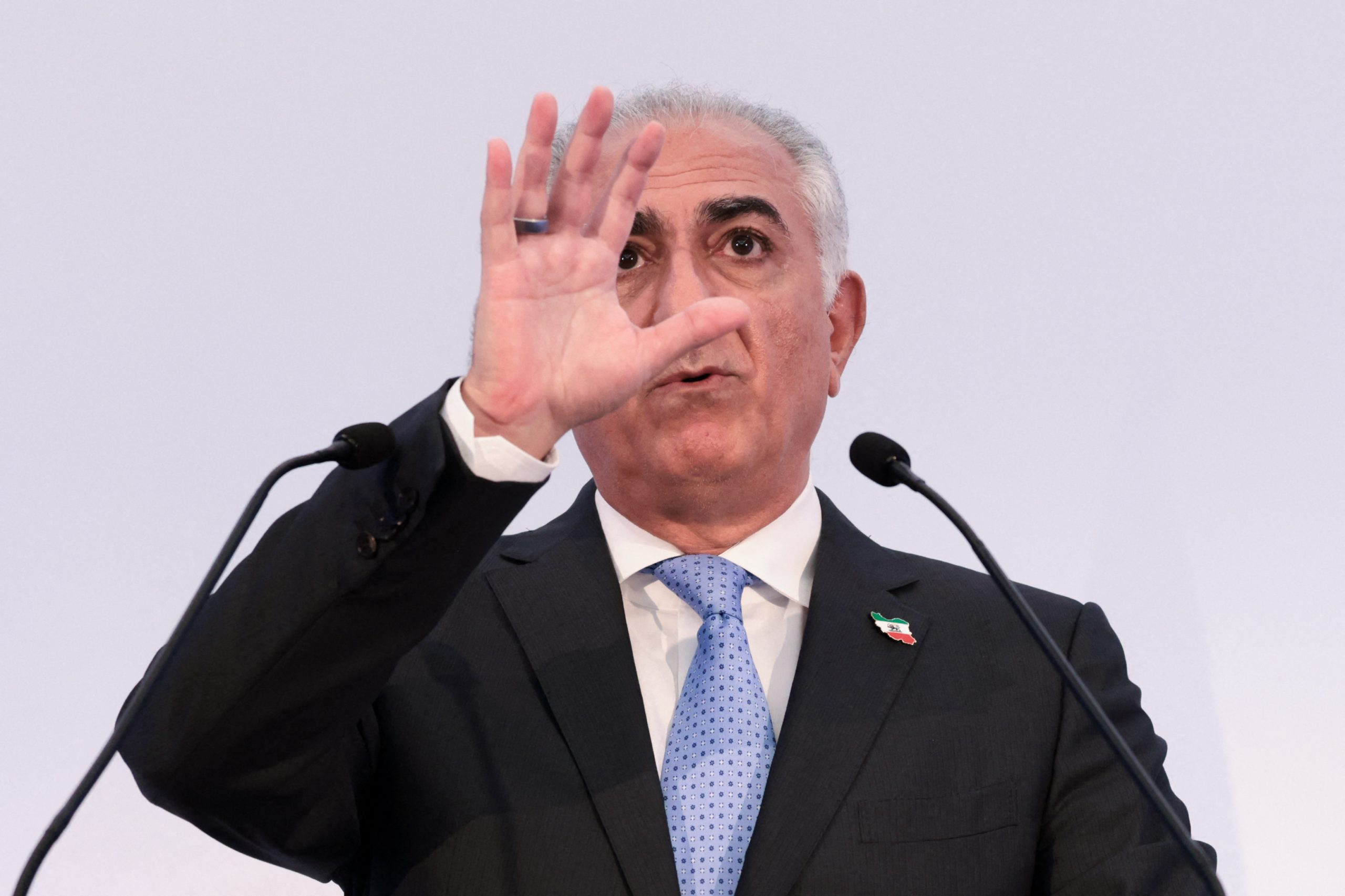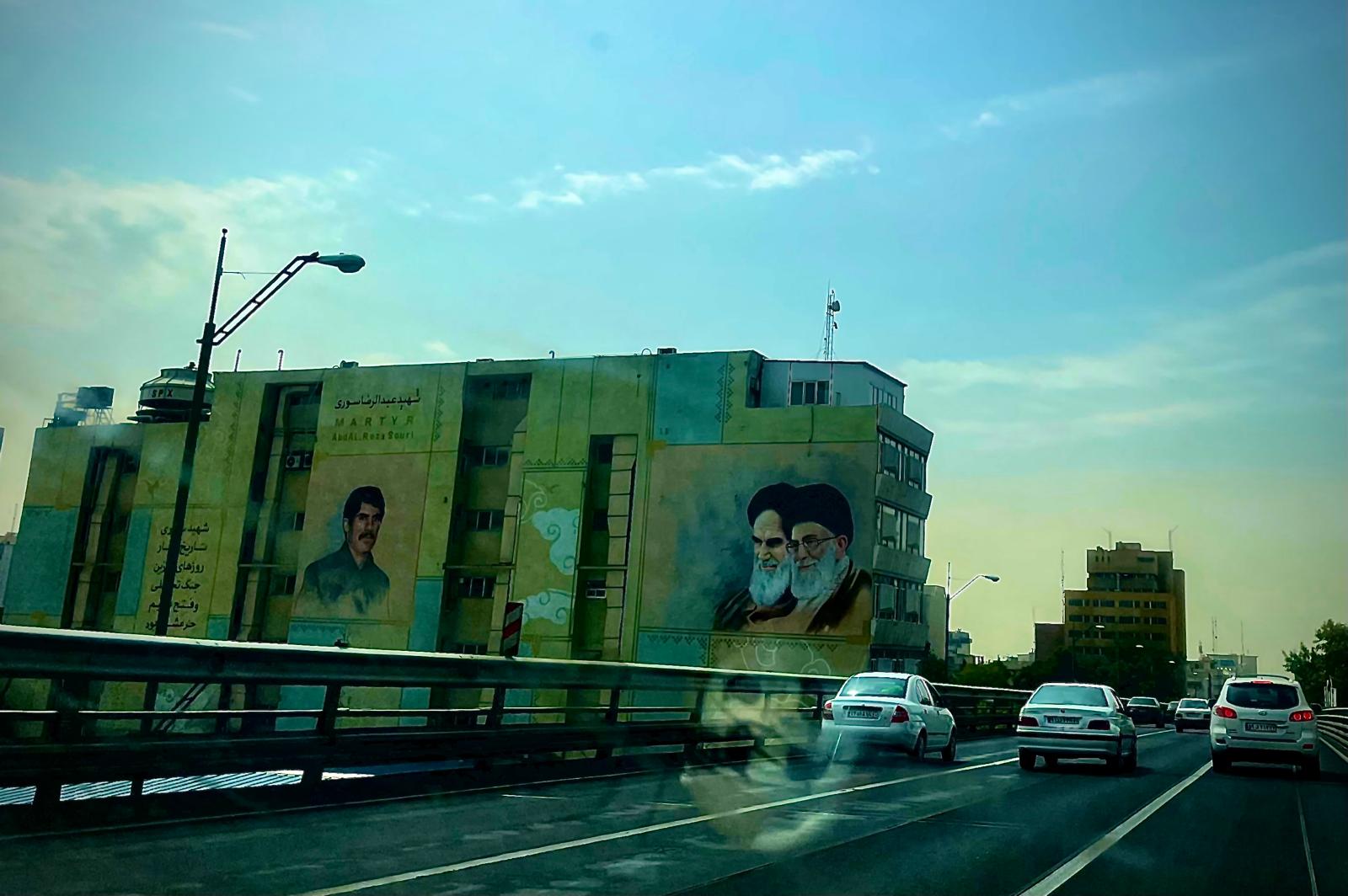Breaking the silencing: Fighting Gender-Based Violences in Northeast Syria

In Qamishli, a woman walks down the street in front of a mural fresco reading “Jin, Jyan, Azadi,” a Kurdish slogan meaning “Woman, Life, Freedom”. With the date of March 8, the International day of struggle for women’s rights | Picture Credits: Angeline DESDEVISES / Hans Lucas.
In Qamishli, a woman walks down the street in front of a mural fresco reading “Jin, Jyan, Azadi,” a Kurdish slogan meaning “Woman, Life, Freedom,” on March 8, the International Day of Struggle for Women’s Rights. | Picture Credits: Angeline DESDEVISES / Hans Lucas.
This article is co-authored by Chloé Troadec and Angéline Desdevises
In North and East Syria, women from all communities are leading a daily struggle against gender-based and sexual violence. Through pioneering legal reforms, autonomous support networks, and the pursuit of economic independence, they are confronting the very roots of patriarchy. Yet, despite these advances, male domination prevails—as the future of this progressive model remains uncertain.
Institutionalized Patriarchy as a Legacy of the Ba’athist Regime
On the minibus on the way to the funeral of two YPG (People’s Protection Units) fighters, Arifê, a woman in her forties, recalls her years as a women’s activist under the Ba’ath regime: “I was arrested, tortured, and imprisoned in 2007, while working with [the women’s organization] Yekîtiya Star (Union of Ishtar)”. Now a member of Meclîsa Jinên Sûriyê (Syrian Women’s Assembly – SWA), she resumed her work as soon as she was released, continuing to fight for women’s rights and against a system deeply rooted in sexism and inequality.
Legally, the Ba’ath system in Syria kept women in perpetual minorhood. Men could divorce unilaterally, while women faced costly, often futile procedures that stripped them of shared property and, frequently, their children’s custody. In inheritance, they received only a quarter of a man’s share; in court, their testimony counted for half. Even as adults, they needed a guardian’s consent to marry. Within families, femicides—long disguised as “honor crimes”—enjoyed near-total impunity until Article 548 was repealed in 2020. A man merely had to claim he had found a woman in a “dishonorable situation” to escape with a few months in prison. “Under Bashar al-Assad, women couldn’t even lift their heads”, sums up Arifê, walking through the gates of the Martyrs’ Cemetery of Qamishlo.
Legal Reforms and the Emergence of a Progressive Framework in NES
It is against this legacy—and against centuries of feudalism and patriarchy—that the anti-patriarchal struggle spearheaded by the Kurdish women’s movement took shape in North and East Syria (NES). Led by Kongra Star (Congress of Ishtar; the restructured successor of Yekîtiya Star) in Kurdish regions and Zenobia in Arab-majority areas, efforts set out to organize women and eradicate all forms of gender-based and sexual violence (GBSV).
When the revolution began in 2012, it set the Autonomous Administration of North and East Syria on a path toward autonomy, breaking away from the administrative and legal traditions that governed the rest of the country. It is now the Women’s Laws—enacted in 2014 and revised as the Family Law in 2023—that regulate sexist social practices and criminalize gender-based violence in the region. They ban child marriage, forced unions, bride exchanges, and polygamy, while guaranteeing women free access to justice.
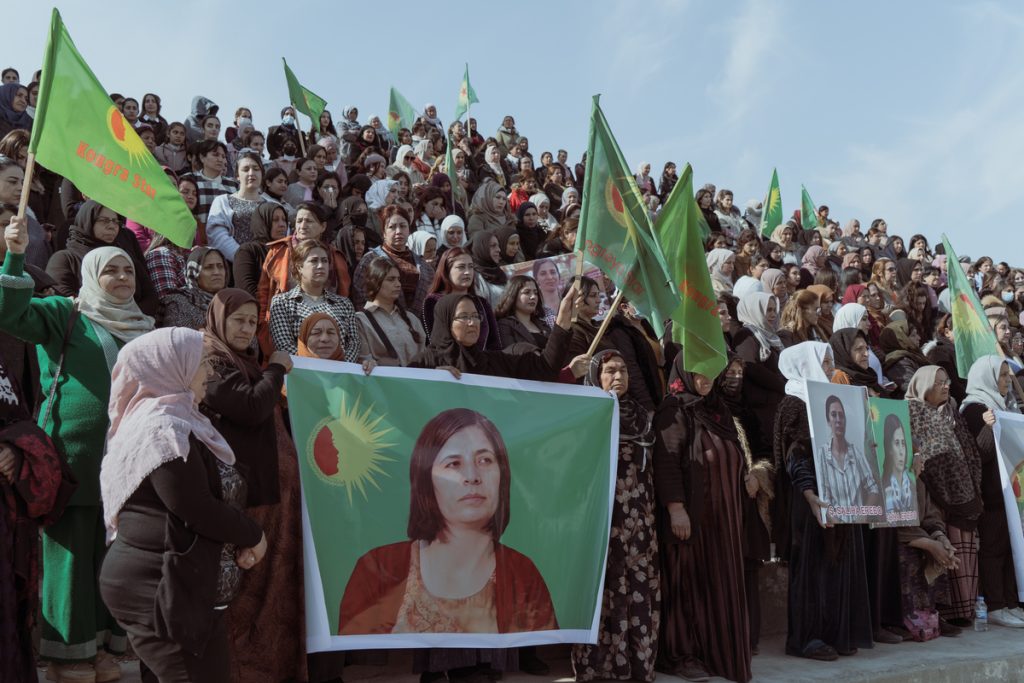
Yet, the revolution also inherited a deeply male-dominated judicial system. One of the first priorities of the Women’s Justice Assembly of the DAANES was to train women as judges and lawyers. Today, every case in the legal system of NES is heard by a panel of three judges, one of whom must be a woman.
“It’s still not enough”, deplores a lawyer from the women’s organization, Sara.
To counter ingrained sexist biases and stereotypes within the judiciary, Women’s Justice Assemblies were established in every canton. They bring together volunteers from the Women’s Houses (mala jin), reconciliation committees, the People’s Justice Council, and female judges and lawyers. They report to the Women’s Justice Assembly of NES.
At its monthly meetings, each assembly reviews court decisions involving women, assessing them against family law and women’s rights. The Jazeera canton alone last year handled 35 femicides, 25 underage marriages, and 319 cases of domestic violence. The assembly can appeal or refer rulings to the Court of Cassation when judgments violate the law or disadvantage women, especially when victims, under social pressure, refrain from doing so themselves. It is also the only body authorized to overturn a Cassation ruling.
In a courtroom of the Qamishlo tribunal, Arzu’s bright red robe cuts through the gray monotony of bureaucracy. A lawyer with the Sara organization, Arzu, represents the case of a 26-year-old disabled woman who was brutally murdered. “We request the footage from the cameras overlooking the crime scene”, she explains. Under the Family Law, Sara automatically represents victims in all femicide and gender-based violence cases. For each case, lawyers receive the prosecutor’s reports but often conduct their own field investigations to fill the gaps.
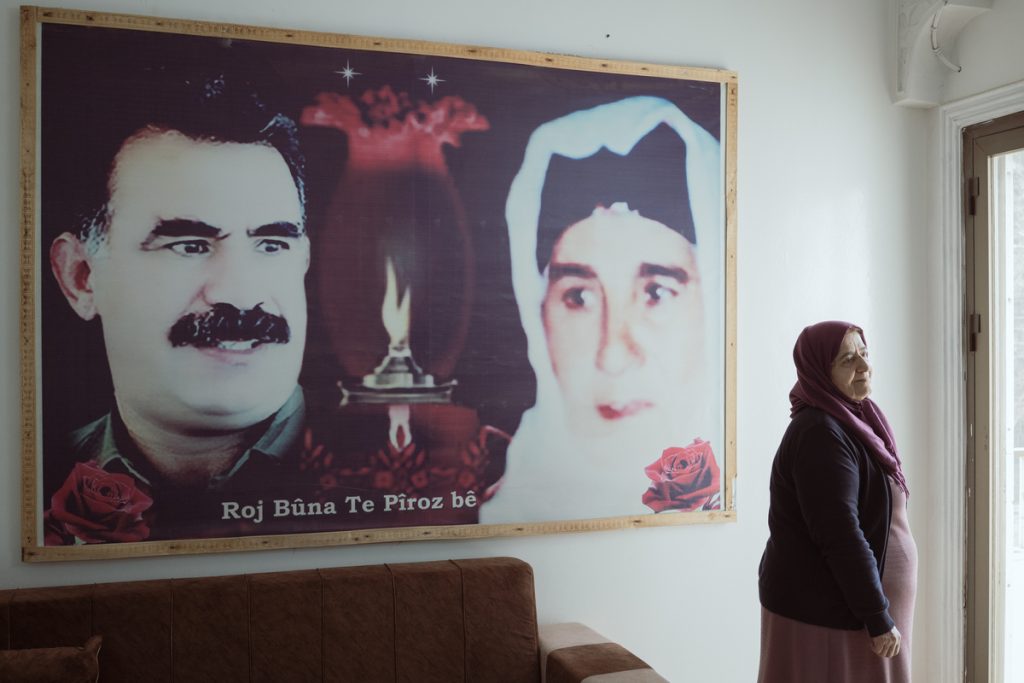
Together with her colleague Resha, Arzu has been investigating the young woman’s death for weeks. Despite the father’s confession, suspicious questions remain unanswered. Both women have completed six months of legal training, and frequent participation in hearings has improved their skills.
In cases of women’s suicides, they also question families and neighbors. “People are more willing to confide in us because we are neither officials nor police”, explains Arzu, adding that witnesses and new evidence often allow them to reclassify a suicide as femicide, punishable by life imprisonment, 20 years behind bars.
Victories come, but the work is grueling. “We are constantly met with contempt from many male lawyers defending the perpetrators”, the women admit. That day, however, they leave the courthouse smiling: they have secured a new hearing to present surveillance footage, and the Asayish (security forces) will track down two potential witnesses they identified.
Avoiding the Courtroom: Victim Support and Conflict Resolution
Before reaching the courtroom, women can turn to the network of women’s movement structures—from Kongra Star to the Women’s Houses, or even their local commune – a small assembly charged with dealing with daily issues and information, and applying NES measures at the level of a village or a neighborhood. Once a case falls under criminal law, however, a formal complaint must be filed with the Asayish.
These security forces have dedicated female units that receive victims 24/7, register complaints, place women in protective shelters if needed, and, alongside male colleagues, can summon suspects or launch preliminary investigations.
Officers in Qamishlo consider themselves fortunate that daily complaints have dropped to “about five per day”, which they see as a sign of declining domestic violence. They note, however, that many abuses—psychological, economic, or workplace harassment—remain largely unreported.
The existing procedures, however, are not always applied as the law intends. This is illustrated by the case of Rojyana, a 40-year-old woman who left her abusive husband a year ago. Despite her harrowing account and visible injuries, the Asayish sent her to the Women’s House instead of formally registering her complaint. “It was as if this were a minor dispute, a simple desire for divorce”, she recalls.
The Women’s Houses—22 in the Jazeera canton—operate on the principle of “conflict resolution,” modeled on the Reconciliation Committees present in every commune and governance level. Across the Jazeera canton, 87 committees, made up of 390 volunteers, feed into local justice assemblies. In 2024, they resolved 7,957 of 9,670 conflicts. Successful reconciliation involves an agreement signed by both parties and a third-party witness, easing court congestion—though tribunals remain accessible if the lower-level process fails. “The system is effective and free; it helps keep the social fabric intact rather than fragmenting it,” says Rêjin Salih, one of the three coordinators in Jazeera.
While the efficiency and innovation of this system have earned broad societal support, and many citizens have turned to it, applying its methods to domestic violence remains challenging, given existing relations of oppression and inequality within families. Early in the revolution, some even referred to the Women’s Houses as “divorce houses,” for enabling women to leave abusive husbands, but volunteers insist that their goal is “not to dissolve families.” Thus, in cases involving couples, they focus on listening to and reasoning with both sides, educating the men. Only when reconciliation fails do they accompany women to court and help prepare their legal cases.
Beyond marital disputes and violence, they handle inheritance conflicts, denial of work or education, child custody, and online harassment—a growing concern. In just ten days, six girls sought help for threats by men to share their intimate photos or deepfakes. The Women’s Houses coordinate with the Asayish to arrest perpetrators, delete images, and, in some cases, pursue legal action or training programs. They often avoid informing the girl’s family, who might view her as guilty or “dishonored,” as in Amina’s case. Accused of a premarital relationship, she was threatened with death. Volunteers from the women’s house suggested a virginity test as “the only way to calm the family”. The young girl agreed, anxious to prove her innocence.
While married women are automatically believed when they report rape, girls who are still virgins are subjected to this practice, although it amounts to a form of secondary victimization.
The Women’s Houses also rely on the Kurdish women’s movement network abroad—for example, to help a young woman break off an engagement with a man in Germany who was forcing her into a dangerous migration path, or to track down a cyber-harasser in Iraqi Kurdistan.
Samira, though a volunteer in a women’s civil defense organization, initially refused to let her daughter end her engagement, but the women activists intervened, forcing her to respect Bêrîtan’s choice. The mother still grinds her teeth at the memory of this intervention in a matter she believed “should have stayed within the family.” Bêrîtan, 16, had first turned to the women of Kongra Star. “I knew them personally, thanks to my mother,” she now jokes. Her eyes sparkle with pride: after this, she has been hired in a civil position within the Syrian Democratic Forces (SDF)—and enjoys her newfound independence.
Claiming Public Space
Women’s ability to report violence is rooted in a shift in their social representation and public participation. For Majida, co-chair of Kongra Star in Kobanê, the establishment of a women’s system across society “sparked a desire to organize”. She notes an unprecedented respect for women, their ideas, and their work. The co-chair rule in all institutions, autonomous women’s assemblies at every level, and the growing presence of women in political spaces create an environment that fosters speaking out against gender-based sexual violence. “Today, a woman victim comes directly to us, whereas before she didn’t recognize the violence as such or have the courage to report it,” explains Lojin, the second co-chair.
“The YPJ fighters were the first source of inspiration,” says Majida, standing by a statue of Arîn Mirkan, a fallen guerrilla in the fight against ISIS. Lojin adds, “Many women think, ‘if they did it, so can I’” Daily courage is also drawn from women in the Asayish and the autonomous women’s units of the Civil Defense Forces (HPC-Jin).
On an evening in Hasakah, Bara’a straps on her cartridge belt and, with fellow HPC-Jin volunteers, grabs her weapon and climbs into the back of a pickup to patrol. They sometimes intervene directly in cases of violence, like ten days ago, when they rescued a child from abusive, drug-addicted parents. More often, they are alerted by neighbors and respond at the household level, in coordination with male colleagues and the Asayish.
Developing Gender Consciousness for Self-Defense
The Asayisha Jin (Women’s Security), along with other autonomous women’s structures, is central to prevention and awareness-raising. They intervene in communes, families, neighborhoods, and villages under the coordination of Kongra Star or Zenobia. In Raqqa, Khode Al-Issa, spokesperson for Zenobia, emphasizes, “our work is to make women aware of the depth of the patriarchal system.” After years under ISIS, this task is daunting. They rely on the Autonomous Administration’s network to reach all women’s cooperatives, ministries, refugee camps, and academies.
The women’s press network also supports this effort. Jin TV, an all-women’s TV channel, broadcasts prevention clips, reports on women’s institutions, and hosts debate programs on violence. It notably covered the 2019 abortion campaign in Argentina, despite the taboo on the subject in Syria. “We were one of the only channels to do so, but it’s vital to show that women should decide for themselves,” explains Medya, broadcast supervisor. She believes their public interest stems from their closeness to the population: “We amplify women’s voices and show that their experiences are not isolated,” she adds. Female journalists are supported by the Yekîtiya Ragihandina Jin (Women Journalists’ Union), which helps them shape topics and secure decision-making roles in newsrooms.
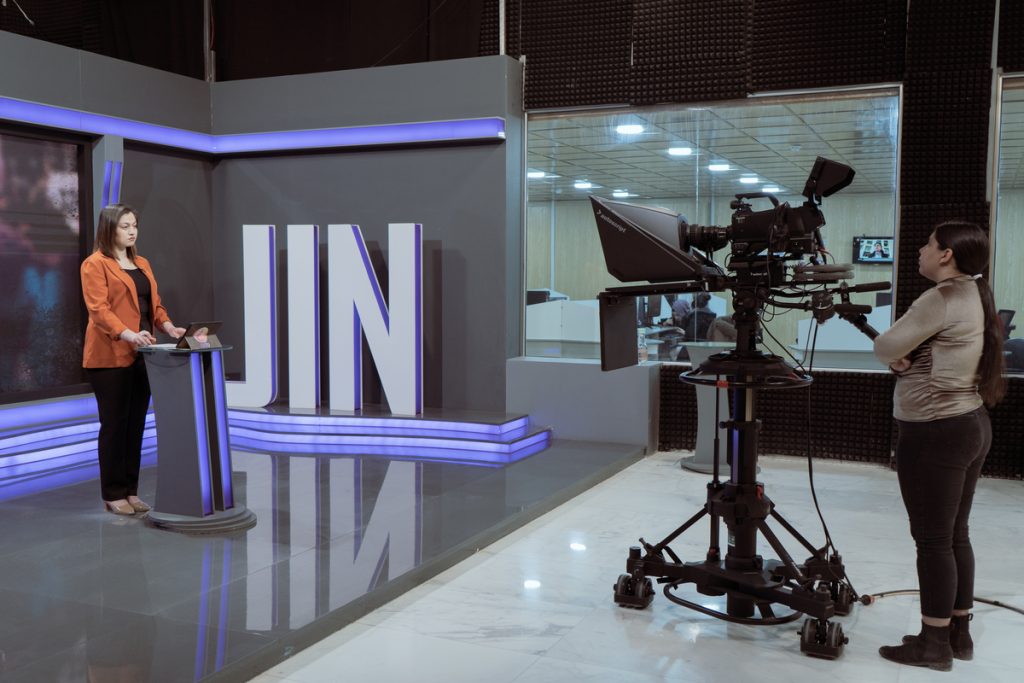
In schools, prevention starts in primary school with “Life and Society” classes that address equality and women’s role in history and society. At high school, which has been co-ed for only two years, resistance remains. “Around fifteen families out of three hundred still pose problems,” says Jiyan, a teacher. These families fear their daughters might form socially unacceptable romantic relationships. In her 11th-grade classroom, Jiyan teaches this women’s science developed by the Kurdish women’s movement and aimed at understanding and fighting patriarchy. She explains: “Sexism also means keeping women out of public spaces, shaming them for laughing, speaking loudly, or defending their country!” The students nod in unison—though how these lessons translate to the playground remains to be seen.
Financial Independence: A Cornerstone of Emancipation
The lack of income or savings is a major barrier to women’s autonomy and ability to escape violent family structures, in a society where reproductive labor falls almost entirely on women. To address this, the Kongra Star Economic Committees create professional opportunities through training programs, cooperatives, and public production units. While their work is multifaceted, it faces challenges due to the region’s deteriorating economy and regular attacks from Turkey.
“Our first projects focus on agriculture,” says Şervîn, walking through the Demsal farm in Tirbesipîyê, which employs mostly women. Spanning 215 hectares, the farm produces fruits, vegetables, and grains, paying women based on their work and liberating them from the feudal and sexist violence that has long plagued agricultural production. “We don’t want a capitalist model that exploits workers,” Şervîn stresses. Each worker is responsible for her own greenhouse and manages her work autonomously.
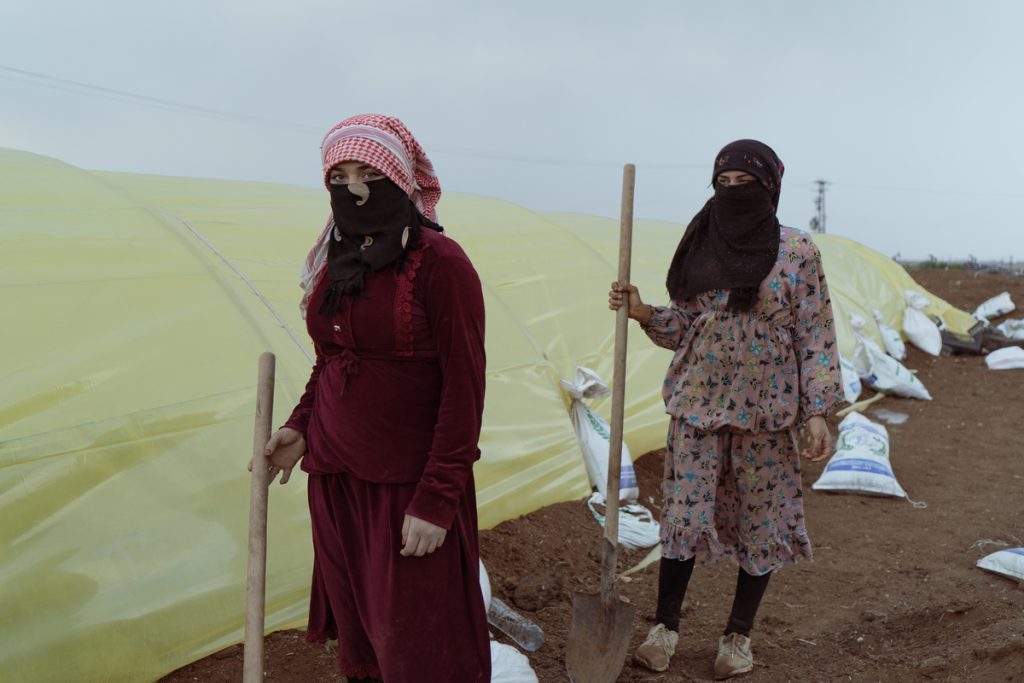
In Hasakah, the committee oversees agricultural, textile, bakery, shoemaking, canning, and laundry cooperatives, involving over 200 women. “They’re not just workers; they invest, work, make decisions, and share the profits,” Şervîn explains. New participants, often in precarious situations, are identified through communes and Kongra Star. Participation in the cooperatives, coupled with training, has transformed family dynamics: some women have divorced or rejected polygamous marriages after reaching some economic independence.
Persistent Patriarchy: Obstacles to Women’s Liberation
Despite the existence of Women’s Laws and a network of women’s organizations, the fight against gender-based and sexual violence faces several challenges. Many actors in this system acknowledge the limits to women’s emancipation, especially the central role of the family as an unassailable social structure. Rojyana experienced this first-hand when she sought help from the Women’s House: “For a while, they told me to stay with [my husband], for the children, to endure.” However, her children urged her to leave the violent man who “could eventually kill her.”She recounts losing her temper that day in the Women’s House office and finally receiving justice from a women’s movement representative who visited the institution.
For many women, even a violent family feels preferable to solitude, which is morally and politically seen as an individualistic and precarious model. Outside the all-women’s communal village of Jinwar, alternatives to family-based living are scarce, and historical examples of collective living are yet to be widely shared and re-imagined.
Sexist mentalities, rooted in feudalism and global patriarchy, continue to permeate mentalities—even within legal structures meant to protect women. Yara, a young lawyer, recalls a court hearing where a woman was disadvantaged for sexist reasons, despite the judge being a woman. “Unfortunately, some older women believe that since they could endure that amount of sexism, we must, too,” she adds. Rojyana shares this view: “Some have worked in this field for years, undergoing many educations, but few have changed because social norms are too strong.” Both women now place hope in the next generation. Medya, the broadcaster at Jin TV, emphasizes the importance of representation: “If something is forbidden, but you see other women doing it on TV, you think, ‘it’s possible for me, too’” she explains, referring to the struggle for abortion rights.
“We still have a long way to go,” stresses Majida in Kobanê. “In rural areas, mindsets are shaped by old feudal systems, and reaching women is harder.” Territories are also unevenly covered by women’s structures. In Deir-ez-Zor, “a woman cannot even go out at night,” reports a local worker. Several women’s offices have been attacked, including one belonging to Zenobia, which was burned down in mid-October. In the cities, conservative reflexes are triggered, as some families, fearing ‘urban dangers’, refuse to let adolescent girls leave the house or attend school.
Among all forms of gender-based violence, sexual violence remains the most invisible, shielded by an almost total code of silence. Statistics from the Jazeera Women’s Justice Assembly speak for themselves: only eight cases of rape and twelve attempted rapes were tried in the Jazeera canton in 2024. “Rape is only considered violence when committed by a stranger,” laments Roj, one of the Assembly’s judges. When perpetrated within marriage, it is seen as a conjugal duty; when committed by someone known, it is often suppressed at all costs. The social taboo around premarital sexual relations ensures that men remain silent about their victims, who risk being blamed simply for interacting with someone.
While physical violence against children is largely normalized, sexual violence and incest remain highly taboo. Few women’s structures address these issues proactively, and training programs rarely include them. The topic is absent from school curricula. “We need education on the body, sexuality, and sexual violence from primary school onwards,” says a Kongra Star activist and mother of two. The revolution has reached a plateau; after the establishment of public institutions, it is time to open the door of the household.
Preserving Gains Amid Political Uncertainty
In Kobanê, Halimê’s pensive gaze drifts out the window. She sits deftly despite the prosthesis that replaced her leg, lost in a Turkish drone strike on her car. Then, an activist with the Sara Organization, she was known in Turkey as a prisoner in Turkish-occupied Syrian territories. That April evening in 2024, she had just returned from visiting asurvivor of domestic violence. “Erdogan targets women to stop them from political organizing and defending themselves,” she says. Halimê knows that she joins the long list of Kurdish activists assassinated or injured in Turkish attacks. Although such strikes have decreased in recent months in Rojava, Ahmed al-Sharaa’s rise to power brings little hope for women activists.
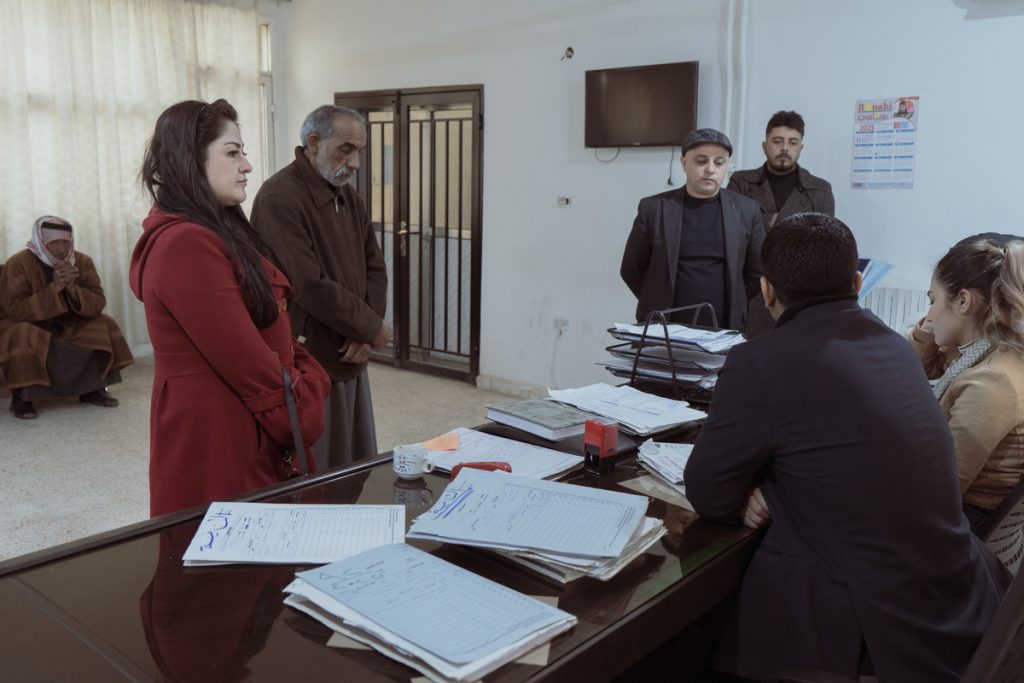
The ranks of the new Syrian army include many fighters from Turkish proxy forces that occupied Afrin, Serêkaniyê, and Girê Spî—groups responsible for femicides like that of Kurdish activist Hevrîn Khalaf, as well as mutilations and sexual violence used as weapons of war. The legacy of Hay’at Tahrir al-Sham (HTS)governance in Idlib raises grave concerns for women in North and East Syria. “In the new government, there will be no space or rights for women,” Majida warned as early as February. In Qamishlo, Arifê from the Syrian Women’s Assembly stresses the legal threat: “They want to stop women from becoming judges and push them out of the courts”.
To secure political representation, rights, and justice against gender-based violence, women activists in North and East Syria see only one path: to continue and expand their struggle. “We want to take part in drafting the constitution and preserve all our laws and institutions,” says Khode Al-Issa in Raqqa. Through Zenobia and the SWA, they’ve launched consultation sessions across Syria, from Damascus to Tartus, aiming to extend the North and East Syria social contract and women’s laws nationwide. “Women are surprised by our level of organization; most had only a distorted image of North and East Syria, shaped by propaganda,” explains Mona, another SWA member.
Although they have worked clandestinely across Syria since 2017, the current political situation offers an unprecedented opportunity to rally Syrians against patriarchal violence and for emancipation. The recent struggle to ensure that the YPJ retains independent battalions within the Syrian army is part of what Arifê calls the fight for “operational women’s rights,” enabling women to fight practically—even militarily.
From Kobanê, Halimê remains resolute: “They took my leg, but not my voice. I am not afraid to speak—or to die”.
Chloé Troadec is a journalist and translator who holds a master’s degree in political science. She lived in north-eastern Syria for around four years, during which time she co-founded the Rojava Information Centre and conducted extensive field research. Her work has been published in french and international press.
Angéline Desdevises is a writter and photographer, member of the Hans Lucas press agency. My work on social issues in conflict zones is published by the French press and international press.
The Amargi
Amargi Columnist


